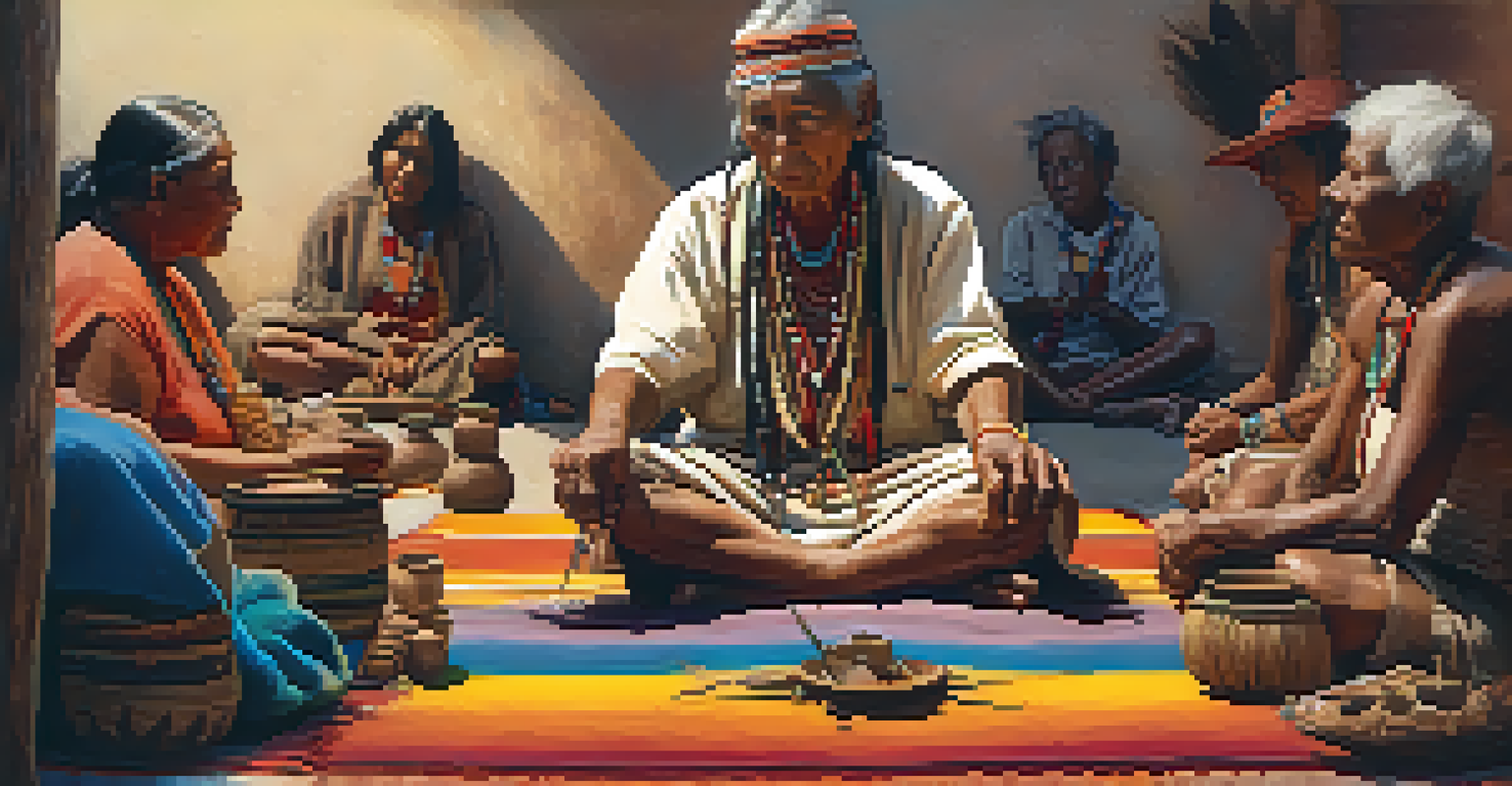Cultural Misunderstandings Surrounding Entheogen Use

Understanding Entheogens: More Than Just Psychedelics
Entheogens, often referred to as psychedelics, are substances that induce altered states of consciousness. However, the term encompasses a broader cultural and spiritual significance that is frequently overlooked. In many cultures, these substances are used for religious rituals, healing practices, or personal growth, making them integral to community identity.
The use of entheogens is a bridge to sacred knowledge and profound healing.
Misunderstanding entheogens as merely recreational drugs undermines their deep-rooted connections to tradition and spirituality. For instance, indigenous communities in the Amazon have utilized ayahuasca for centuries as a means of connecting with the spiritual realm. Recognizing these practices invites a more respectful dialogue around their use.
As society grapples with the resurgence of interest in entheogens, it's vital to approach this topic with cultural sensitivity. By understanding their historical context, we can better appreciate the profound experiences they offer, rather than reducing them to mere substances for escapism.
Cultural Appropriation: A Delicate Balance
Cultural appropriation often arises when individuals from one culture adopt elements from another, typically without understanding the original significance. With entheogens, this can lead to practices that strip away the sacred context of these substances. For example, yoga classes incorporating ayahuasca ceremonies can misrepresent and commercialize traditions that hold deep spiritual meaning.

This situation highlights the need for awareness and respect when engaging with practices from other cultures. It’s not just about participating; it’s about honoring the lineage and intentions behind these rituals. Engaging with indigenous leaders or practitioners can provide insights that foster respectful participation.
Cultural Significance of Entheogens
Entheogens play a vital role in various cultures, serving as tools for spiritual connection and personal growth rather than merely recreational substances.
Navigating these waters requires an open mind and humility to learn. By acknowledging the origins and significance of these practices, we can cultivate a deeper appreciation and avoid the pitfalls of appropriation.
The Role of Western Medicine in Entheogen Use
As Western medicine increasingly acknowledges the therapeutic potential of entheogens, a cultural clash emerges. Many indigenous practices approach healing as a holistic experience, while Western medicine often seeks to isolate and treat symptoms. This difference in perspective can lead to misunderstandings in how these substances are used and perceived.
When we take psychedelics, we are not only exploring our own consciousness but also connecting with the wisdom of ancient traditions.
For instance, the use of psilocybin in clinical trials for depression illustrates a growing acceptance of entheogens in medical circles. However, this medicalization risks stripping away the cultural and spiritual contexts that give these substances their meaning. It raises important questions about who gets to dictate how these substances are used and for what purposes.
The challenge lies in integrating these diverse perspectives in a way that honors the origins of entheogenic practices while exploring their benefits. Bridging the gap requires collaboration between Western researchers and indigenous healers, ensuring that both scientific and cultural insights are respected.
Legal and Social Implications of Entheogen Use
The legal status of entheogens varies widely across the globe, impacting their use and perception. In some countries, substances like peyote and psilocybin are protected under religious freedom laws, while in others, they remain strictly prohibited. These legal frameworks often reflect deeper societal attitudes towards these substances and their users.
For example, in the U.S., the push for decriminalization in certain cities has sparked conversations about drug policy and social justice. Advocates argue that these changes not only allow for personal exploration but also address historical injustices faced by indigenous communities. This highlights the interconnectedness of legal reform, cultural respect, and social equity.
Western Medicine's Evolving Role
The integration of entheogens in Western medicine highlights the need to respect their cultural origins while exploring their therapeutic potential.
Understanding these legal and social dynamics is crucial for fostering informed discussions about entheogen use. As societal views continue to evolve, it’s essential to consider the implications of these changes on cultural practices and community identities.
Misconceptions Around Safety and Efficacy
One of the most pervasive misconceptions about entheogens is that they are inherently dangerous. While any substance can pose risks, many studies indicate that when used responsibly, entheogens can offer therapeutic benefits. This misunderstanding often stems from sensationalized media portrayals and a lack of understanding about proper usage.
For instance, the adverse effects often reported in studies may stem from improper settings, lack of guidance, or pre-existing mental health conditions. Engaging with trained professionals or participating in structured retreats can help mitigate these risks, allowing users to explore entheogens safely and meaningfully.
By reframing the conversation around safety and efficacy, we can create a more balanced perspective on entheogen use. This includes emphasizing the importance of education, preparation, and integration in ensuring positive experiences.
Navigating the Spiritual Landscape of Entheogen Use
The spiritual aspects of entheogen use can often be misunderstood or dismissed in contemporary society. For many, these substances serve as a gateway to deeper self-awareness and connection with the universe. However, without proper context, this spiritual dimension can be overlooked or misrepresented.
For example, the use of mushrooms in a ceremonial setting can foster a profound sense of community and interconnectedness. Yet, when treated as mere party drugs, these experiences can lose their transformative potential. It’s essential to communicate the importance of setting intentions and cultivating the right environment when engaging with entheogens.
Legal Implications and Social Justice
The legal landscape surrounding entheogens reflects societal attitudes and raises important discussions about drug policy, cultural respect, and social equity.
By promoting a dialogue that includes both spiritual and psychological dimensions, we can help demystify these practices. This approach encourages a holistic understanding that honors the experiences of those who have journeyed through these altered states.
Future Perspectives: A Respectful Approach to Entheogens
As interest in entheogens continues to grow, it's crucial to foster a respectful and informed approach. This involves engaging with the cultures from which these substances originate and acknowledging the wisdom they offer. Building relationships based on respect and understanding can lead to richer experiences for all involved.
Future discussions should prioritize collaboration between scientists, practitioners, and cultural custodians. This partnership can help ensure that both the therapeutic potential and cultural significance of entheogens are preserved. Such a comprehensive approach could pave the way for responsible use that honors both tradition and innovation.

Ultimately, embracing the complexity of entheogen use requires humility and a willingness to learn. By valuing the diverse perspectives surrounding these substances, we can create a more inclusive and respectful narrative that enriches our understanding of human consciousness.